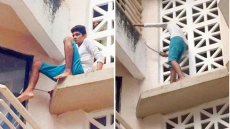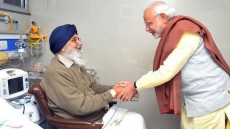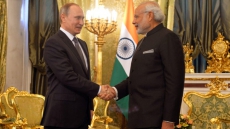Eleven days after a terror attack killed 18 soldiers in Jammu and Kashmir, India carried out "surgical strikes" on terrorist launch pads across the Line of Control, inflicting massive casualties and dramatically heightening tensions in the region.
An unspecified number of terrorists and Pakistani troops were killed in the late Wednesday operation across Kupwara and Poonch sectors as the army moved Special Forces into Pakistan-held Kashmir, officials said on Thursday.
Pakistan, however, insisted that no "surgical strike" took place and that there were only firing and artillery shelling between the two armies across the Line of Control (LoC) that killed two of its soldiers and left some others wounded. Pakistan threatened to repel any Indian attack.
Hours after New Delhi announced the "surgical strike", Home Minister Rajnath Singh briefed opposition leaders. Foreign Secretary S. Jaishankar separately met diplomats from 22 countries over the Indian operation.
A high alert was sounded on Thursday along the Pakistan border in Punjab and Gujarat. Army columns moved towards the Punjab border while villagers in a 10-km border belt in the state were told to move to safer areas. In Gujarat, fishermen were told not to venture into the sea.
The Indian military said it targeted "some terrorist teams" across the LoC on Wednesday night.
"During these counter-terrorist operations, significant casualties have been caused to the terrorists and those who support them," Director General of Military Operations (DGMO) Lt Gen Ranbir Singh told media.
He provided no specific details. But Union Minister for Urban Development M. Venkaiah Naidu said Indian forces attacked five to six terrorist launch pads. Sources said 38 terrorists were killed.
Army chief Gen Dalbir Singh was in the operations room on Wednesday night as the assault began at midnight. It ended around 4.30 a.m. on Thursday.
The commandos were reportedly air-dropped close to the LoC and they struck at seven terrorist launch pads 2-3 km inside Pakistan-held territory.
Pakistan Prime Minister Nawaz Sharif decided on Thursday to call a cabinet meeting on Friday in view of the "unprovoked aggression of Indian security forces ... and deteriorating situation in Jammu and Kashmir".
He said "our intent for peaceful neighbourhood should not be mistaken as our weakness", adding that Pakistan can "thwart any evil design made to undermine the sovereignty of Pakistan".
The Pakistan military said: "The notion of surgical strikes linked to alleged terrorist bases is an illusion deliberately generated by India."
Terrorists fighting Indian rule in Jammu and Kashmir are known to be based in the Pakistan-held territory of divided Kashmir, enjoying the backing of the Pakistani military and terror groups aligned with Pakistani intelligence.
Lt Gen Ranbir Singh said the terrorists killed in the surgical strikes had planned to infiltrate and target Jammu and Kashmir and other metros in the country.
"The operation was basically focussed to ensure that these terrorists do not succeed in their design," he said.
The DGMO said the operation had since ceased. "We do not have plans of further continuation of the operations. However, the Indian armed forces are fully prepared for any contingency that may arise."
Thursday saw the Pakistani military shelling Indian positions across the LoC -- which divides Jammu and Kashmir between the two countries -- at Danesh and Lakshmi posts in Naugam sector, police said. The Indian Army retaliated.
Pakistan said the exchange of firing lasted from 2.30 a.m. till 8.00 a.m., leaving two Pakistani soldiers dead. "Pakistani troops befittingly responded to Indian unprovoked firing," the Pakistan military said.
The Indian DGMO said he spoke to his Pakistani counterpart and told him about the overnight operation.
"It is India's intention to maintain peace and tranquility in the region but we cannot allow the terrorists to operate across the LoC with impunity and attack the citizens of the country.
"We expect the Pakistan Army to cooperate with us to erase the menace of terrorism from our region," he added.
In New Delhi, Congress President Sonia Gandhi and other opposition leaders said they backed the government's decision to go for "surgical strikes".
SURGICAL STRIKES BEGAN AT MIDNIGHT, HOW THEY WERE CONDUCTED
1 In the surgical strikes spread over a 250 km arc, troops went 2 km deep into territory occupied by Pakistan, in terrain that included hills, forests and mountains, sources said.
2 Seven terrorist launch pads were targeted before the Indian troops returned around 4.30 am. Each terrorist launch pad had 30 to 40 terrorists and the army says there were "massive casualties".
3 A combination of ground forces and helicopter-borne paracommandos were involved in what India called a preemptive strike.
4 ”Full surprise was achieved," said sources. The troops started moving in the afternoon.
5 Heavy firing in Kashmir's Uri - the site of the terror attack in which 18 soldiers were killed earlier this month - was used as a distraction as soldiers were pushed into Pakistan Occupied Kashmir, sources say.
6 The soldiers had clear orders "not to leave bodies or buddies behind", said sources.
7 ”Our forces have gone deep in and come back before sunrise," government sources said. Pakistan was caught off guard and opened fire this morning, India retaliated.
8 Sources say India has video evidence of the strikes, including some obtained through drones, which will be released when it is considered appropriate.
9 According to the army, the terrorists were planning attacks in Jammu and Kashmir and in metros. The launch pads had been under surveillance for about a week.
10 Sources say since the September 18 attack on an Uri army base by terrorists from Pakistan, the forces had been asked to be ready to take on terror launch pads.




